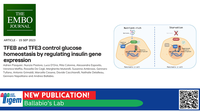Authors: Adrien Pasquier, Nunzia Pastore, Luca D'Orsi, Rita Colonna, Alessandra Esposito, Veronica Maffia, Rossella De Cegli, Margherita Mutarelli, Susanna Ambrosio, Gennaro Tufano, Antonio Grimaldi, Marcella Cesana, Davide Cacchiarelli, Nathalie Delalleau, Gennaro Napolitano and Andrea Ballabio.
Year: 2023
Sources: The EMBO Journal
Abstract:
To fulfill their function, pancreatic beta cells require precise nutrient-sensing mechanisms that control insulin production. Transcription factor EB (TFEB) and its homolog TFE3 have emerged as crucial regulators of the adaptive response of cell metabolism to environmental cues. Here, we show that TFEB and TFE3 regulate beta-cell function and insulin gene expression in response to variations in nutrient availability. We found that nutrient deprivation in beta cells promoted TFEB/TFE3 activation, which resulted in suppression of insulin gene expression. TFEB overexpression was sufficient to inhibit insulin transcription, whereas beta cells depleted of both TFEB and TFE3 failed to suppress insulin gene expression in response to amino acid deprivation. Interestingly, ChIP-seq analysis showed binding of TFEB to super-enhancer regions that regulate insulin transcription. Conditional, beta-cell-specific, Tfeb-overexpressing, and Tfeb/Tfe3 double-KO mice showed severe alteration of insulin transcription, secretion, and glucose tolerance, indicating that TFEB and TFE3 are important physiological mediators of pancreatic function. Our findings reveal a nutrient-controlled transcriptional mechanism that regulates insulin production, thus playing a key role in glucose homeostasis at both cellular and organismal levels.
Category: journals

